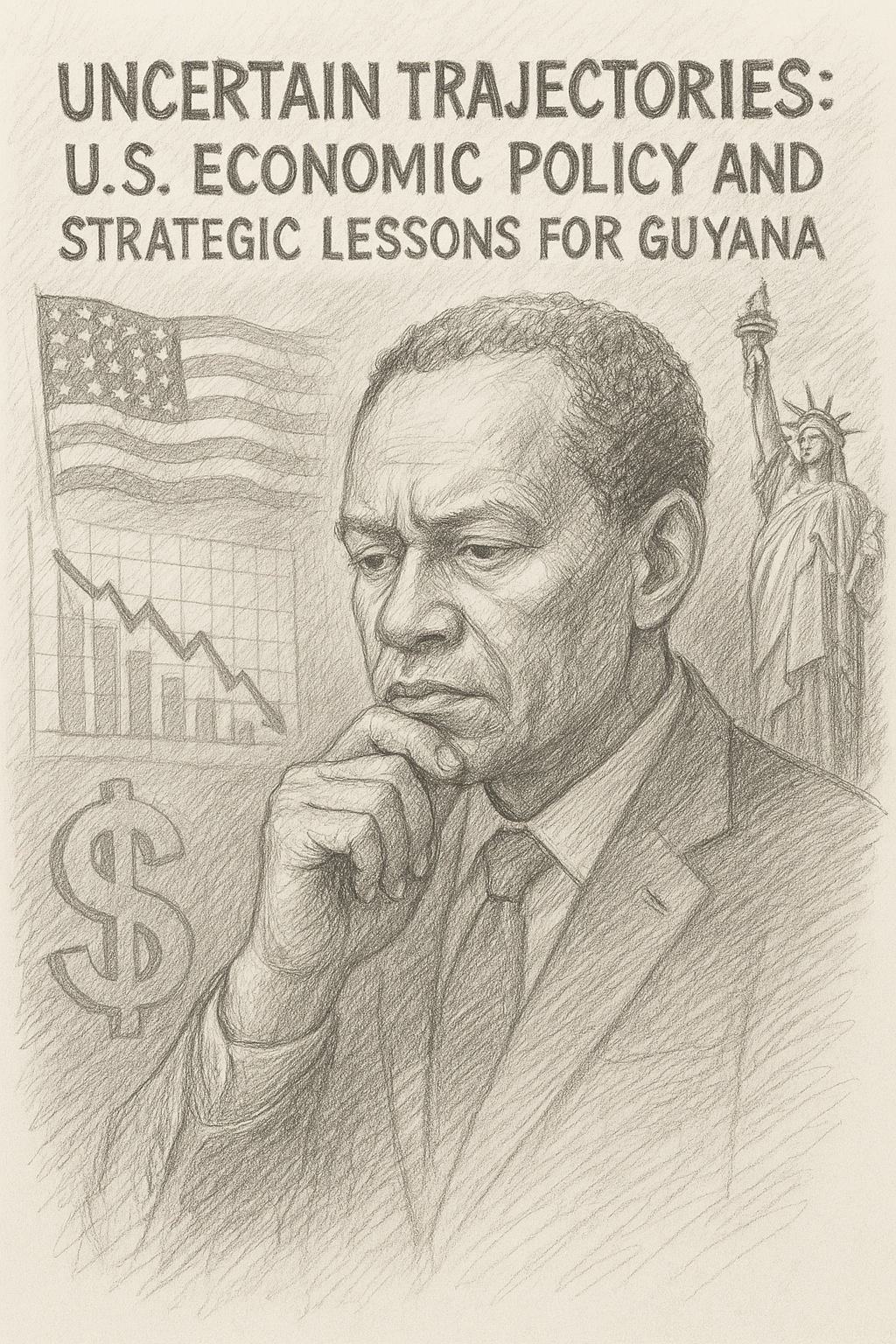Uncertain Trajectories: U.S. Economic Policy and Strategic Lessons for Guyana
By
Terrence Richard Blackman, Ph.D.
A recent discussion on the trajectory of U.S. economic policy revealed a sobering reality: even the most powerful economies can drift into strategic incoherence when short-term political imperatives overwhelm long-term planning. The American economy remains a global leader in terms of scale, innovation, and resilience; however, its current economic governance raises questions about sustainability. For Guyana, a country at the dawn of transformative opportunity, this unfolding U.S. experience holds valuable lessons.
The conversation explored the ongoing reliance on tariffs as a tool of U.S. trade policy. Despite political rhetoric that frames these tariffs as measures to punish foreign competitors, their economic consequences fall squarely on American consumers and businesses. Prices rise, supply chains are disrupted, and investment decisions are postponed due to persistent uncertainty. The broader lesson here for Guyana is that trade policy must be guided not by short-term nationalist sentiment but by a clear strategy to enhance competitiveness and diversify economic output. Guyana’s future hinges not simply on oil exports, but on our ability to add value across sectors—from agriculture and tourism to services and technology.
The discussion turned to fiscal policy, painting a concerning picture. The U.S. federal debt is on track to reach 130 percent of GDP by 2034, driven by sustained deficit spending and political gridlock. This debt overhang poses risks to interest rates, private investment, and broader economic stability. For Guyanese policymakers, the warning is clear. Our current oil revenues must not lull us into complacency or reckless expansion of the state. A rigorous commitment to savings, fiscal discipline, and institutional strengthening must temper the temptation to spend for visibility. The Natural Resource Fund is a vital instrument, but its effectiveness will be limited by the governance framework that supports it. We must ensure that our fiscal choices reflect not the pressures of the moment, but the needs of future generations.
Immigration, a long-standing contentious issue in U.S. politics, is central to the country’s economic vitality. Foreign-born workers now make up 18 percent of the labor force and have higher participation rates than native-born Americans. Yet restrictive immigration policies threaten this strength, potentially stalling population growth and reducing economic dynamism. Guyana faces a similar yet distinct challenge. Our labor market is constrained by decades of brain drain, and our population growth is modest. To thrive, we must develop a national strategy to engage the Guyanese diaspora, attract skilled migrants, and invest in human capital development within our country. The global talent competition is intensifying, and we cannot afford to lose ours or fail to bring it back.
Monetary policy in the U.S. remains anchored by the Federal Reserve’s dual mandate of stable inflation and full employment. Yet the Fed’s efforts are increasingly complicated by policy volatility in other domains. Trade and fiscal shocks introduce pressures that limit its ability to act with clarity. For Guyana, the parallel imperative is the establishment of a central bank that is not only independent but also well-resourced and trusted. As we deepen our involvement in the financial sector and integrate into global capital markets, monetary stability will become increasingly essential. Inflation control, currency credibility, and financial regulation are the foundations upon which real economic growth is built.
The overarching concern voiced throughout the discussion was that current U.S. policy lacks coherence. Decisions made in trade, fiscal, immigration, and monetary domains often conflict rather than reinforce each other. This absence of coordination breeds uncertainty and undermines investor confidence. For Guyana, the lesson is not to duplicate American policy but to heed the risks of fragmented governance. We must build a national development strategy that aligns across sectors, integrates across timelines, and centers equity and resilience. The oil era gives us the means, but only sound, synchronized policymaking will provide us with the ends.
The American experience demonstrates that even abundant resources and institutional power do not guarantee wise economic leadership. As Guyana carves out its place on the global stage, we must observe, reflect, and act. We must manage our resources with humility, build our institutions with care, and resist the pull of expediency. Our small size grants us agility, and our moment demands vision.
We should draw insight from America’s strengths and learn from its stumbles. The choices we make now will echo far beyond this decade. Guyana must govern not merely for today’s headlines, but for the country we hope to be in 2030 and beyond.
Support Independent Analysis
The Guyana Business Journal is committed to delivering thoughtful, data-driven insights on the most critical issues shaping Guyana’s future—from oil and gas to climate change, governance, and development. We invite you to support us if you value and believe in the importance of independent Guyanese-led analysis. Your contributions help us sustain rigorous research, expand access, and amplify the voices of informed individuals across the Caribbean and the diaspora.
📢 Please support the Guyana Business Journal & Magazine today
Thank you for standing with us.
Dr. Terrence Richard Blackman
Guyana Business Journal

